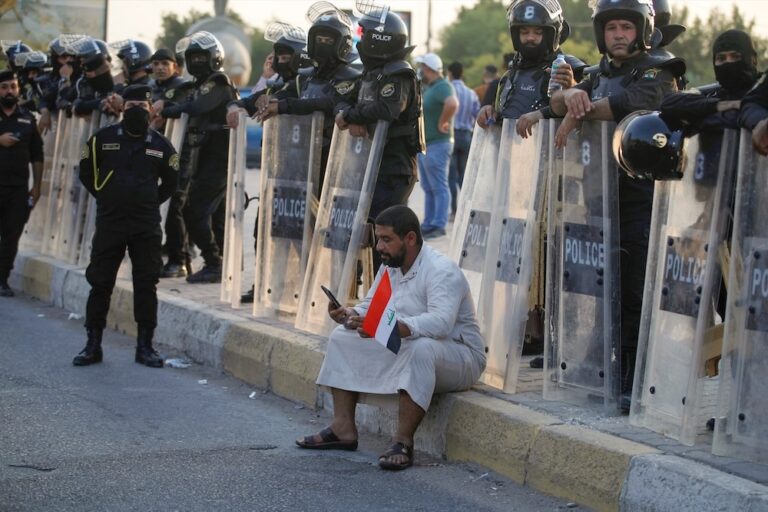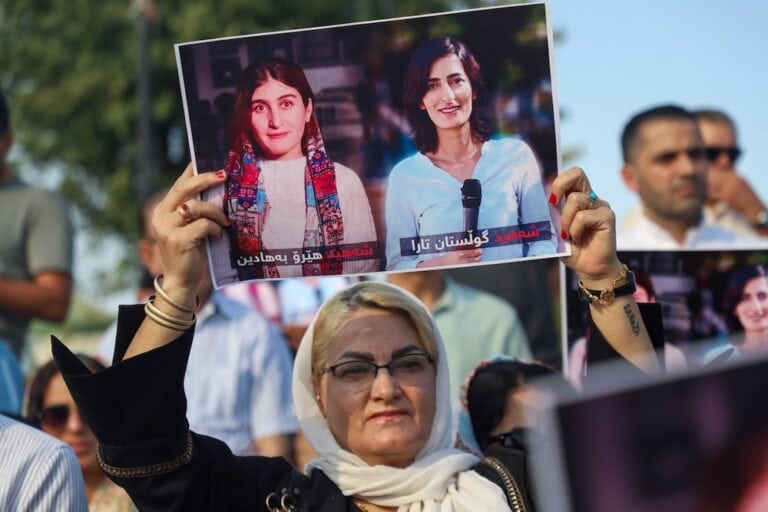The authorities should hold accountable those responsible for attacking protesters and journalists in Arbil and Sulaimaniya, including opening fire on demonstrators and beating them severely, Human Rights Watch said.
(Human Rights Watch/IFEX) – New York, April 21, 2011 – Kurdistan authorities should end their widening crackdown on peaceful protests in northern Iraq, Human Rights Watch said today. The authorities should hold accountable those responsible for attacking protesters and journalists in Arbil and Sulaimaniya since April 17, 2011, including opening fire on demonstrators and beating them severely, Human Rights Watch said.
Human Rights Watch also called on Iraqi authorities in Baghdad to investigate the detention and torture of a protester, Alaa Nabil, and to charge or release more than two dozen activists held in a prison in Baghdad’s Old Muthanna Airport. Central government and Kurdistan Regional Government authorities should revoke their recent bans on unlicensed demonstrations in Sulaimaniya province and on street protests in Baghdad, Human Rights Watch said.
“Iraqi authorities in Kurdistan and Baghdad need to rein in their security forces and protect the right to protest peacefully,” said Joe Stork, deputy Middle East director at Human Rights Watch. “The Iraqi political authorities need to end their knee-jerk responses and stop banning protests, detaining demonstrators, and beating journalists.”
In the afternoon of April 18 in Arbil, the Kurdistan capital, dozens of armed men in civilian clothes attacked students from the Kurdistan region’s largest university, Salahadin, as they tried to hold a demonstration. Witnesses told Human Rights Watch that the assailants also attacked journalists and at least one member of parliament.
A third-year Salahadin student told Human Rights Watch that a large group of organized assailants wearing civilian clothes attacked the protesters with brute force.
“We chanted ‘freedom, freedom,’ and then security forces came and abolished the demonstration,” the student said. “They were hitting people by knives and sticks . . . and arrested 23 protesters.”
The assailants beat Muhamad Kyani, a member of the Iraqi national parliament for the opposition party Goran (Change) List, and his bodyguard while they were walking away from the demonstration. “There was no violence from us, nothing happened from our side to incite them,” Kyani told Human Rights Watch. “I was on my way to the car when the Asayish [the official security agency for the Kurdistan region] threw me to the ground and started to kick and beat me.” Kyani had two black eyes and other minor injuries from the beating. “They just wanted to intimidate and insult me and those with me,” he said. “During the beating they swore at us and called me a traitor.”
Reporters without Borders documented attacks on at least 10 journalists covering the April 18 protest. The group said assailants also detained numerous journalists, including Awara Hamid of the newspaper Rozhnam, Bahman Omer of Civil Magazine, Hajar Anwar, bureau chief of the Kurdistan News Network, and Mariwan Mala Hassan, a KNN reporter, as well as two of the station’s cameramen.
Shwan Sidiq of Civil Magazine was hospitalized after the assailants broke his hand. “My hand is broken, my head still hurts,” he told Human Rights Watch. “What I saw was what in 1988 Saddam Hussein did against me and my family.”
Security forces of the Kurdistan Regional Government and the two ruling parties there, the Kurdistan Democratic Party and the Patriotic Union of Kurdistan, have used repressive measures against journalists since the start of the protests in Iraq on February 17. The local press freedom group Metro Center has documented more than 150 cases of attacks and harassment of Kurdish journalists since February 17. In March, Human Rights Watch interviewed more than 20 journalists covering the protests in Kurdistan.
“Time and again we found that security forces and their proxies violate journalists’ freedom of expression through death threats, arbitrary arrests, beatings, harassment, and by confiscating and vandalizing their equipment,” Stork said.
In Sulaimaniya, daily clashes since April 17 have injured more than 100 protesters, journalists, and security forces. Witnesses told Human Rights Watch that on April 17 security forces fired live ammunition into the air to clear protesters blocking a road, while others shot into the crowd indiscriminately, wounding at least seven demonstrators.
“Police and security forces used everything to attack us,” one protester told Human Rights Watch. “They opened fire, threw stones, used sticks and their Kalashnikovs to keep us from demonstrating.”
Protest organizers told Human Rights Watch that on April 18, security forces violently seized control of Sara Square, the center of daily protests in Sulaimaniya since February 17, and demolished the protesters’ podium. Security forces have fanned out across the city and have refused to allow protesters back to the site – renamed Azadi (Freedom) Square by demonstrators – resulting in clashes on April 18 and 19.
On March 6, masked assailants attacked demonstrators and set their tents on fire but failed to evict protesters from the site.
On April 19, protest organizers said, security forces detained dozens of students and others in and around Sulaimaniya, releasing most later in the day. One law undergraduate told Human Rights Watch that security forces attacked her and other protesters at the Dukan checkpoint on their way to Sulaimaniya.
“We were forced to get off the buses,” she said. “They threatened if we went [to the protest], we would be killed. A friend of mine asked them not to shoot us because we have pens and not guns, but when he raised his pen security forces opened fire and he was badly injured.”
Since then, this student said, she has received anonymous threatening phone calls telling her not to return to Sulaymaniya. Security forces raided Koya University, where she studies, and arrested two students. Their whereabouts remain unknown.
The family of a prominent Kurdish writer and activist, Rebin Hardi, told Human Rights Watch that security forces severely beat him during and after his arrest on April 19 for participating in a protest in front of the Sulaimaniya courthouse. Photos taken after his release later that day viewed by Human Rights Watch showed severe swelling up and down the right sight of his body including his eye, arm, and thigh.
(. . .)


